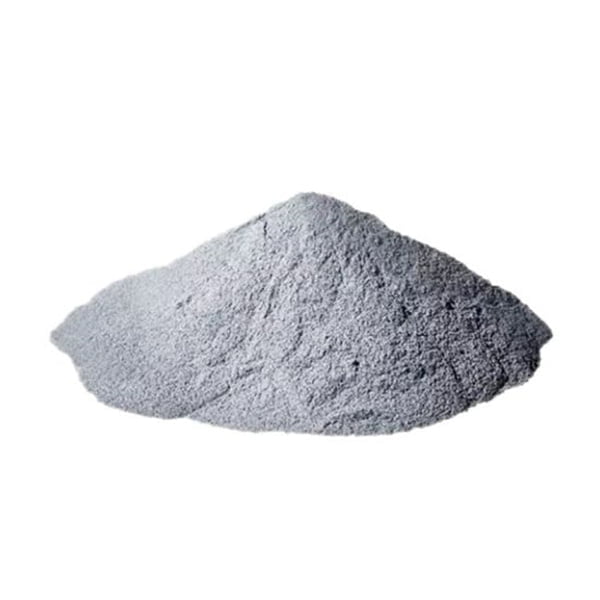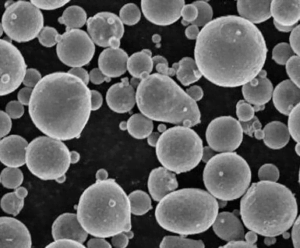
PREP Bubuk Paduan Titanium Tahan Api
Tinjauan Umum tentang Bubuk Paduan Titanium Tahan Api PREP Paduan PREP (Proses Elektroda Berputar Plasma) adalah bubuk paduan titanium tahan api berkinerja tinggi yang dirancang untuk pembuatan komponen aditif yang membutuhkan sifat mekanik yang sangat baik pada suhu ekstrem. Artikel ini memberikan panduan komprehensif untuk bubuk paduan titanium PREP yang mencakup komposisi, properti, parameter cetak, aplikasi, spesifikasi, pemasok, penanganan, inspeksi, perbandingan, ...
MOQ kecil
Sumber yang fleksibel untuk ratusan produk
Dukungan kustomisasi
Bedak yang disesuaikan dengan industri
Pengiriman cepat
Dengan DHL Express, aman dan cepat langsung ke tangan Anda
Overview of PREP Refractory Titanium Alloy Powder
PREP (Plasma Rotating Electrode Process) alloy is a high-performance refractory titanium alloy powder designed for additive manufacturing of components needing excellent mechanical properties at extreme temperatures.
This article provides a comprehensive guide to PREP titanium alloy powder covering composition, properties, print parameters, applications, specifications, suppliers, handling, inspection, comparisons, pros and cons, and FAQs. Quantitative information is presented in easy-to-reference tables.
Composition of PREP Titanium Alloy Powder
PREP alloy has a complex composition containing various solute elements:
| unsur | Berat % | Makna |
|---|---|---|
| Titanium | Keseimbangan | Principal matrix element |
| Aluminium | 5 – 7 | Solid solution strengthener |
| Tin | 1 – 3 | Solid solution strengthener |
| Zirkonium | 0.5 – 2 | Grain structure control |
| Molybdenum | 1 – 3 | Solid solution strengthener |
| Silikon | 0.5 – 1.5 | Ketahanan oksidasi |
| Niobium | 1 – 3 | Carbide former |
| Tantalum | 1 – 3 | Carbide former |
Trace amounts of boron and carbon are also added for grain boundary strengthening.
Properties of PREP Titanium Alloy Powder
PREP alloy exhibits an exceptional combination of properties:
| Property | Deskripsi |
|---|---|
| kekuatan tinggi | Excellent tensile and creep strength up to 700¡«C |
| Fatigue resistance | High fatigue life at elevated temperatures |
| Keuletan retak | Up to 100 MPa-©|m |
| Ketahanan oksidasi | Forms protective oxide scale |
| Stabilitas termal | Microstructural stability after prolonged exposures |
| Damage tolerance | Resistant to crack growth |
| biokompatibilitas | Tidak beracun dan Tidak menimbulkan alergi |
The properties enable lightweight components for demanding applications.
AM Print Parameters for PREP Titanium Alloy Powder
Typical AM process parameters include:
| Parameter | Nilai Tipikal | Makna |
|---|---|---|
| Tinggi lapisan | 30-50 Ã×m | Resolusi versus kecepatan membangun |
| Kekuatan laser | 150-500 W | Peleburan yang cukup tanpa penguapan |
| Kecepatan pemindaian | 750-1500 mm/s | Kepadatan versus laju produksi |
| Jarak penetasan | 80-120 Î ± m | Sifat mekanik |
| Penekanan isostatik panas | 900¡«C, 100 MPa, 3 hrs | Eliminate internal voids |
Parameters optimized for density, microstructure, build rate and post-processing requirements.

Applications of 3D Printed PREP Titanium Parts
PREP alloy components serve critical applications including:
| Industri | Komponen |
|---|---|
| Aeroangkasa | Turbine blades, compressor parts, mounts |
| Otomotif | Connecting rods, valves, turbocharger wheels |
| Perubatan | Orthopedic implants, surgical tools |
| Kimia | Pumps, valves, reaction vessels |
| Pembangkit Listrik | Hot gas path components |
Benefits over wrought equivalents include complex geometries and accelerated development.
Specifications of PREP Titanium Powder for AM
PREP alloy powder must meet strict specifications:
| Parameter | Spesifikasi |
|---|---|
| Rentang ukuran partikel | Tipikal 15-45 ¼ m |
| Bentuk Partikel | Morfologi bulat |
| Kepadatan Semu | >2.5 g/cc |
| Kepadatan Ketuk | >4.5 g/cc |
| Debit aliran ruangan | >35 sec for 50 g |
| Kemurnian | >99.95% |
| Kandungan Oksigen | <1000 ppm |
Custom size distributions and controlled oxygen levels available.
Suppliers of PREP Titanium Alloy Powder
PREP alloy powder is supplied by:
| Pemasok | Lokasi |
|---|---|
| Praxair | Amerika Serikat |
| AP&C | Kanada |
| Tekna | Kanada |
| Metalysis | Inggris |
| Teknologi LPW | Inggris |
| EOS | Jerman |
Prices range from $250/kg to $450/kg based on quality, size distribution and order volume.
Handling and Storage of PREP Titanium Powder
As a reactive material, careful handling of PREP alloy powder is essential:
- Store sealed containers under inert gas like argon
- Prevent exposure to air and moisture during handling
- Use properly grounded equipment
- Avoid dust accumulation to minimize explosion risk
- Local exhaust ventilation recommended
- Wear appropriate PPE and avoid inhalation
Proper techniques and controls prevent powder oxidation.
Inspection and Testing of PREP Titanium Powder
PREP alloy powder batches are validated using:
| Metode | Parameter yang Diuji |
|---|---|
| Analisis ayak | Pembagian Ukuran Partikel |
| Pencitraan SEM | Morfologi partikel |
| EDX | Chemistry/composition |
| XRD | Fase yang ada |
| Pycnometry | Kepadatan |
| Debit aliran ruangan | Kemampuan aliran bubuk |
Testing per ASTM standards ensures batch-to-batch consistency.
Comparing PREP Alloy to Alternative Titanium Powders
PREP alloy compares to other titanium materials as:
| Aloi | Kekuatan | Ketahanan oksidasi | Biaya | Kemampuan cetak |
|---|---|---|---|---|
| PREP | Luar biasa | Luar biasa | Tinggi | Baik |
| Ti64 | Baik | Baik | Sedang | Adil |
| Ti6242 | Luar biasa | Baik | Tinggi | Adil |
| CP-Ti | Rendah | Luar biasa | Rendah | Luar biasa |
PREP provides the best all-round properties but at higher cost than workhorse alloys like Ti64.
Pros and Cons of PREP Titanium Powder for AM
| Kelebihan | Kekurangan |
|---|---|
| Outstanding high temperature strength | Expensive compared to Ti64 and CP-Ti |
| Excellent thermomechanical fatigue resistance | Higher density than other titanium alloys |
| Complex geometries feasible | Controlled atmosphere handling mandatory |
| Lower anisotropy than Ti64 and CP-Ti | Processing very technique sensitive |
| Matching properties to PREP wrought forms | Limited suppliers and alloy variants |
PREP enables exceptional performance additive manufacturing but requires very rigorous control of process conditions.
Frequently Asked Questions about PREP Titanium Alloy Powder
Q: What is PREP titanium alloy used for in AM?
A: PREP alloy is used to 3D print lightweight aerospace and automotive components needing extremely high mechanical properties at temperatures up to 700¡«C.
Q: What particle size is recommended for printing PREP titanium alloy?
A: A powder size range of 15-45 microns provides a good balance of flowability, high resolution, and dense printed parts.
Q: Does PREP titanium require hot isostatic pressing after AM?
A: HIP is recommended to eliminate internal voids, maximize fatigue resistance and achieve full density. It may not be mandatory for non-critical applications.
Q: What material has properties closest to PREP titanium alloy?
A: Ti-6Al-4V has comparable density and good high temperature strength, but lower oxidation resistance compared to PREP alloys.
Q: What benefits does PREP alloy offer over Ti-6Al-4V in AM?
A: Key advantages are higher tensile and fatigue strength up to 700¡«C along with significantly better creep and thermo-mechanical fatigue resistance.
Q: What precision can be obtained with PREP titanium printed parts?
A: After post-processing, printed PREP components can achieve dimensional tolerances and surface finish comparable to CNC machined titanium parts.
Q: What defects can occur when printing PREP titanium alloy?
A: Potential defects are cracking, distortion, porosity, incomplete fusion, and surface roughness. Most can be minimized through optimized parameters.
Q: Can support structures be easily removed from PREP titanium AM parts?
A: Properly designed minimal supports are readily detachable after printing due to excellent mechanical properties of PREP alloys.
Q: What type of post-processing is typically done on PREP titanium components?
A: Hot isostatic pressing, heat treatment, abrasive flow machining, CNC machining, and electropolishing are commonly used post-processes.
Q: What is the key difference between Ti-6Al-4V Grade 5 and Grade 23?
A: Grade 5 has higher oxygen content for better powder flowability while Grade 23 has lower oxygen for superior fracture toughness and fatigue resistance.
Hubungi kami sekarang
Silakan hubungi kami untuk penawaran produk terbaru dan ketersediaan stok.
